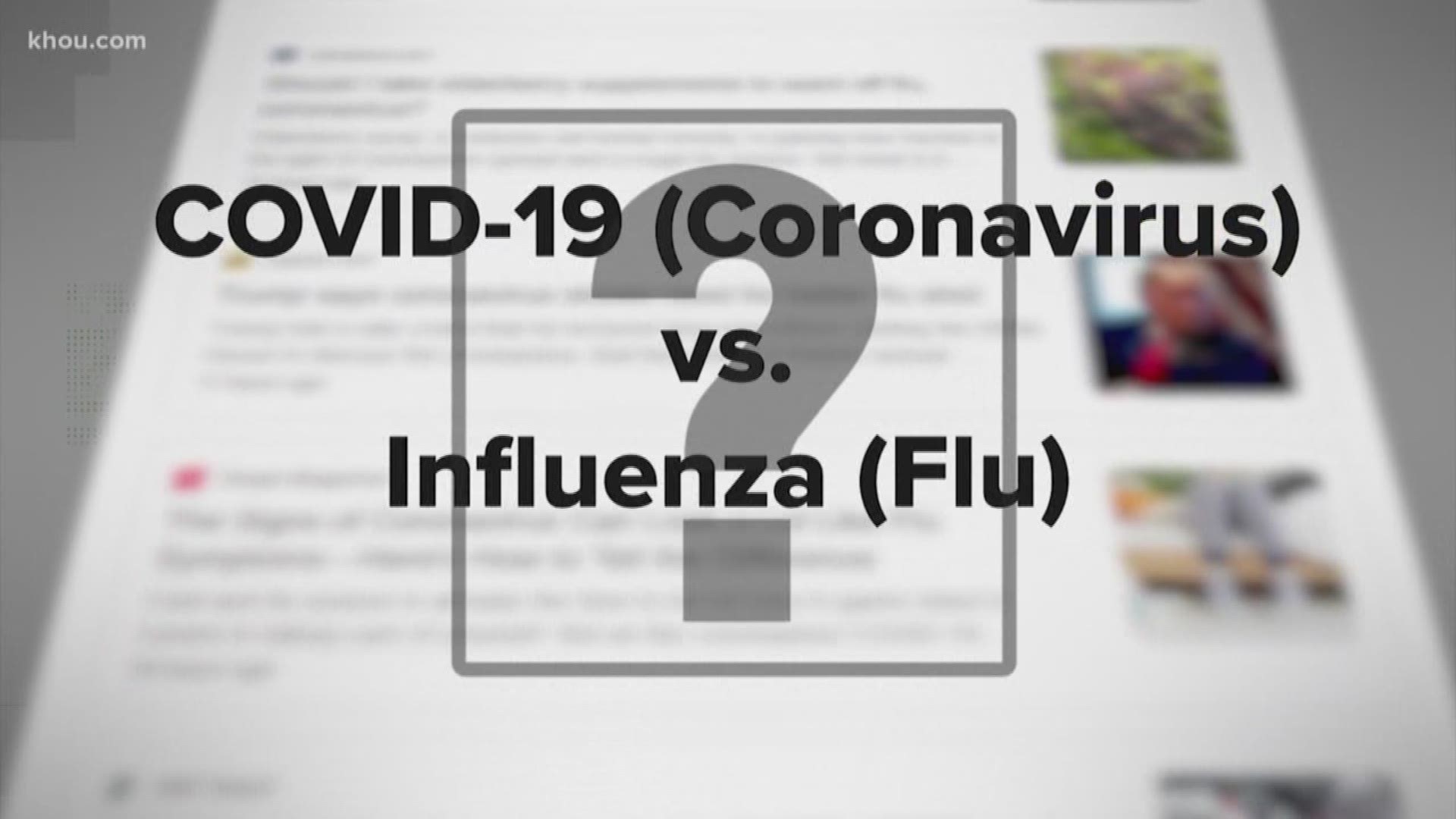Medical experts say you should contact your doctor right away if you have COVID-19 symptoms and you've possibly been exposed to the virus, but sometimes it is hard to tell the difference between having the new strain of the coronavirus, the flu or just allergies.
What is the difference between coronavirus and the flu or allergies?
Coronavirus/COVID-19
Coronavirus symptoms include fever, cough, shortness of breath or difficulty breathing, and symptoms appear 2 to 14 days after exposure.
The severity of COVID-19 symptoms can range from very mild to severe. People who are older or have existing medical conditions, such as heart disease, may be at higher risk of serious illness. This is similar to what is seen with other respiratory illnesses, such as influenza.
Coronaviruses are a family of viruses that can cause illnesses such as the common cold, severe acute respiratory syndrome (SARS) and Middle East respiratory syndrome (MERS). In 2019, a new coronavirus was identified as the cause of a disease outbreak in China.
The virus is now known as the severe acute respiratory syndrome coronavirus 2 (SARS-CoV-2). The disease it causes is called coronavirus disease 2019 (COVID-19).
The flu
Flu symptoms include fever over 100.4 F (38 C), dry cough, chills and sweats, congestion, sore throat, muscle aches, fatigue and weakness.
Influenza is a viral infection that attacks your respiratory system — your nose, throat and lungs. Influenza is commonly called the flu, but it's not the same as stomach "flu" viruses that cause diarrhea and vomiting.
For most people, influenza resolves on its own. But sometimes, influenza and its complications can be deadly.
Allergies
Allergy symptoms include sneezing, itchy nose, itchy eyes, itchy roof of the mouth, runny/stuffy nose and watery, red or swollen eyes.
If you tend to get "colds" that develop suddenly and occur at the same time every year, it's possible that you actually have seasonal allergies. Although colds and seasonal allergies may share some of the same symptoms, they are very different diseases.
Common colds are caused by viruses, while seasonal allergies are immune system responses triggered by exposure to allergens, such as seasonal tree or grass pollens.
Treatment of a common cold may include rest, pain relievers and over-the-counter cold remedies, such as decongestants. A cold usually lasts three to 10 days, although some may last as long as two or three weeks.
Treatment of seasonal allergies may include over-the-counter or prescription antihistamines, nasal steroid sprays and decongestants, and avoidance of exposure to allergens where possible. Seasonal allergies may last several weeks.
If I suspect I have the new coronavirus, when should I see a doctor?
Contact your doctor right away if you have COVID-19 symptoms and you've possibly been exposed to the virus. Tell your doctor if you've recently traveled internationally. Call your doctor ahead to tell him or her about your symptoms and recent travels and possible exposure before you go to your appointment.
Causes
It's unclear exactly how contagious the new coronavirus is. It appears to be spreading from person to person among those in close contact. It may be spread by respiratory droplets released when someone with the virus coughs or sneezes.
Risk factors
Risk factors for COVID-19 appear to include:
- Recent travel from or residence in an area with ongoing spread of COVID-19 as determined by CDC or WHO
- Close contact with someone who has COVID-19 — such as when a family member or health care worker takes care of an infected person
Prevention
Although there is no vaccine available to prevent infection with the new coronavirus, you can take steps to reduce your risk of infection. WHO and CDC recommend following the standard precautions for avoiding respiratory viruses:
- Wash your hands often with soap and water, or use an alcohol-based hand sanitizer.
- Cover your mouth and nose with your elbow or tissue when you cough or sneeze.
- Avoid touching your eyes, nose and mouth if your hands aren't clean.
- Avoid close contact with anyone who is sick.
- Avoid sharing dishes, glasses, bedding and other household items if you're sick.
- Clean and disinfect surfaces you often touch.
- Stay home from work, school and public areas if you're sick.
CDC doesn't recommend that healthy people wear a facemask to protect themselves from respiratory illnesses, including COVID-19. Only wear a mask if a health care provider tells you to do so.
WHO also recommends that you:
- Avoid eating raw or undercooked meat or animal organs.
- Avoid contact with live animals and surfaces they may have touched if you're visiting live markets in areas that have recently had new coronavirus cases.
Source: Mayo Clinic

